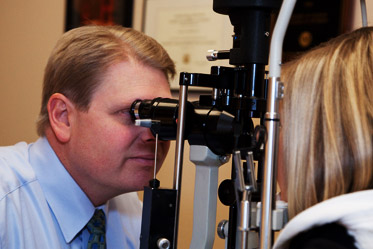Comprehensive Eye Care
Periodic eye examinations are an important part of preventative health care.
Many eye and vision problems have no obvious signs or symptoms. As a result, individuals may not be aware that a sight threatening problem may exist. Early diagnosis and treatment of eye and vision problems are important in maintaining good vision and eye health.
A comprehensive eye examination is more than just checking to see if you need glasses. It is a comprehensive evaluation of your eyes and visual system. The individual tests may vary from one eye doctor to another, but a complete eye examination will include many of the following parts:
Patient History
The patient history is often made up of a patient questionnaire along with questions asked by the doctor or his technician. It establishes any current visual or eye problems that you may currently be experiencing. It will also include questions about any problems you may have experienced with your eyes in the past. You will be asked about any other medical problems you may have had along with questions about any medications you take on a regular basis. Since some medical problems run in families, you might also be asked about the medical conditions of other family members.
Visual Acuity and other Preliminary Tests
It is important to establish how well you see - either with your current glasses or without glasses if you have none. Other screening tests that might be performed check your peripheral vision, eye muscle movements, depth perception, color vision, eye alignment, and pupil response to light.
Refraction
A refraction is the part of the examination where your glasses prescription is determined. Even if you don’t feel you need glasses or if you feel your glasses prescription hasn’t changed, it is important for your doctor to establish what glasses prescription gives you your best vision.
Eye Health Evaluation
At some point in the examination your eye pressures will be measured. This test is a screening test for glaucoma. Glaucoma can develop at any eye pressure, but it is much more common when eye pressures are elevated.
As part of the health evaluation of your eyes, your eye doctor may request that your eyes be dilated. Eye drops can be instilled into the eyes that enlarge the pupil and create a larger window thru which the doctor can see the internal structures of the eyes. When your eyes are dilated you may notice that bright lights are even brighter and your reading vision may be reduced. The dilation typically lasts 3-5 hours.
Your eye doctor will then use a series of lights and magnifying lenses to examine the external and internal structures of the eye.
Additional Testing
Based on the results of the doctors examination, other more in depth testing may be required to rule out problems, clarify results, or provide more in-depth information.
Following your examination, the doctor will explain the results and answer any questions you might have. Recommendations for your future eye care will also be discussed.
